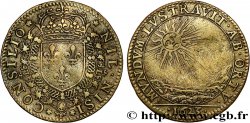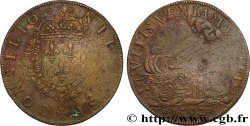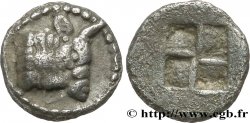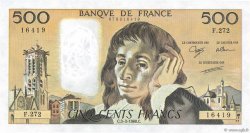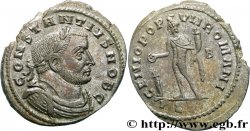fjt_915666 - CONSEIL DU ROI Louis XIV 1661
Ссылки в каталоге: :
Лицевая сторона
Аверс: легенда: MAGNO CONSILIO.
Аверс: описание: Sceptre et main de justice en sautoir; dessous, un globe; dessus, le Soleil rayonnant. Une banderole lie le sceptre et la main de justice; sous cette banderole : UNICO. UNIVERSUS (Tout le royaume sous une seule Loi).
Аверс: перевод: Pour le Grand Conseil.
Обратная сторона
Реверс: легенда: SUA CASTRA VICISSIM ; À L'EXERGUE : 1661.
Реверс: Описание: L'Amour sous une tente, tenant un arc et une flèche allant à droite.
Реверс: перевод: Son camp en retour.
Комментарий
1661 : réforme du conseil. Le sceptre et la main de Justice évoquent l'aspect judiciaire de cette institution. Les affaires multiples dont avait à s'occuper le Conseil du Roi (appelé d'abord Grand Conseil) amena en effet la création par Charles VII en 1497 d'un tribunal permanent qui prit le titre exclusif de Grand Conseil et auquel furent dévolues les attributions judiciaires que l'on enleva au Conseil du Roi. Il était composé du Chancelier de France, des maîtres des requêtes ordinaires de l'Hôtel du Roi et de 17 conseillers ordinaires .
1661: reform of the council. The scepter and the hand of Justice evoke the judicial aspect of this institution. The multiple cases that the King's Council (first called the Grand Council) had to deal with led to the creation by Charles VII in 1497 of a permanent tribunal which took the exclusive title of Grand Council and to which were devolved the judicial powers that were taken away from the King's Council. It was composed of the Chancellor of France, the masters of ordinary requests of the Hôtel du Roi and 17 ordinary councillors
1661: reform of the council. The scepter and the hand of Justice evoke the judicial aspect of this institution. The multiple cases that the King's Council (first called the Grand Council) had to deal with led to the creation by Charles VII in 1497 of a permanent tribunal which took the exclusive title of Grand Council and to which were devolved the judicial powers that were taken away from the King's Council. It was composed of the Chancellor of France, the masters of ordinary requests of the Hôtel du Roi and 17 ordinary councillors









 Cообщить об ошибке
Cообщить об ошибке Распечатать страницу
Распечатать страницу Отправить мой выбор
Отправить мой выбор Задать вопрос
Задать вопрос Consign / sell
Consign / sell
 Информация
Информация
